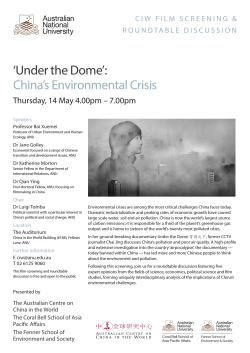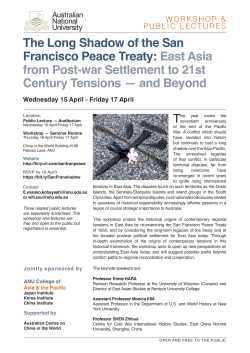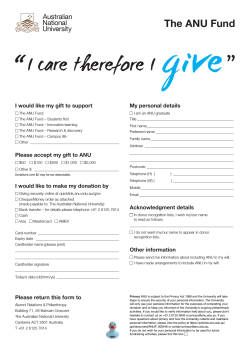
ICT research community workshop program final
Information and Communication Technologies in Melanesia Building a Research Community 20 – 21 April 2015 Crawford Seminar Room 3 JG Crawford Building Lennox Crossing ANU Contact: sarah.logan@anu.edu.au 0420 589 291 #SSGMICT Monday 20 April: Literatures, Debates and Methods Time 09:15 09:30 09:30 10:30 10:30 11:00 11:00 12:00 Name Abstract – Dr Sarah Logan Introduction (SSGM, ANU) – Associate Professor Ethnography in a Digital World. Heather Horst (RMIT) This talk explores the consequences of the presence of digital media in shaping the techniques and processes through which we theorise and practice ethnography. To do so I introduce five key principles for doing digital ethnography with, through and in an environment constituted by digital media. In addition to the development of new and innovative research methods, I argue that doing digital ethnographic research has invited us not only to theorise the digital world in new ways but also to re-think how we have understood pre-digital practices, media and environments. – Morning tea – Professor Gerard Inventing Mobile Communication: From Goggin (University of the Nordic Countries to Melanesia Sydney) Mobile phones first appeared commercially in the late 1970s and early 1980s, and by the late 1990s were the subject of a burgeoning research literature. In this talk, I consider the ‘invention’ of mobile communication, how this has been understood and approached, by different actors, across particular sectors and disciplines, in a diverse range of cultures, societies, and places. While mobile communication is, on the one hand, a transnational, global, increasingly digital media technology, reliant on international networks, protocols, standards, value chains, and political economies (Goggin, Global Mobile Media); on the other hand, mobile communication only takes shape, assumes meanings, and has social practices and ideas associated with it, in specific cultural settings. So, while, for instance, we can speak of the specific cultural and media forms, and communicative architectures, that pertain to mobile communication; we also need to attend to the ways in which mobile communication is implemented, imported and exported, translated and transported, assembled, appropriated, and recirculated in particular places. Local (and translocal), national, and regional cultural and media histories matter greatly for how mobile communication takes shapes in particular societies (cf. Goggin & McLelland, Internationalizing Internet Studies 2009; Routledge Companion to Global Internet Histories 2016). Thus my argument is that, as it unfolds in different parts of the world, mobile communication continues to be reinvented, reshaped, and reimagined. As a consequence, our understanding of mobile communication as a global phenomenon, and eminent international technology, stands to be significantly altered in the process. The early research on mobile communication in Europe, especially the Nordic countries, was influential on our understanding of the transformed nature of public/private through mobiles, or, later, text messaging cultures. Thus the emergent understanding of, and research upon, mobiles in Melanesia, and the Pacific generally, challenges us to rethink the nature of communication and media themselves. 12:00 1:00 1:00 2:00 – Lunch – Dr Amanda Watson Mobile phone-based research methods in (SSGM Visiting Melanesia Fellow, ANU) New research methods have been enabled by the proliferation of mobile phone handsets in Melanesia in recent years. This presentation will consider benefits and drawbacks of new methods, as well as ethical considerations and impacts for researchers. Four innovative research methods will be considered: a) Phone interviews, b) Survey forms installed on handsets, c) SMS data collection, and d) Smartphone applications. 2:00 3:00 – Associate Robert (ANU) Professor Social Media and Development Ackland How we can assess the impact of social media on social and economic development? Social media enables the formation and maintenance of inter-personal networks which can facilitate the exchange of resources such as information, provide emotional support and foster trust. We can therefore draw from research into social networks and social learning to assess the potential development impact of social media. In the context of economic development, social learning can involve technology adoption (e.g. of a productivity-enhancing technology or practice), but it is also key to aspirational change, whereby poor households become more future-oriented in their thinking, leading to investments in, for example, education. What about social networks and social and political development? In societies where democratic values and processes are not well understood, it has been argued that weak ties may be effective in transmitting novel information about unfamiliar political institutions. The paper also argues that country-specific factors make it difficult to draw definitive conclusions about social media and development. First, social media requires telecommunications infrastructure and education levels such that it will be used by the relatively well-off in developing countries and there will be urban/rural disparities in social media access and use. Second, the role of government is important. Governments allocate resources and develop policies relating to ICT infrastructure. Government policy influences the extent to which citizens have the education and digital literacy to benefit from access to the Internet. Government policy towards Internet censorship and surveillance may limit the activities of protest groups aiming to bring about social and political change. Government’s own Internet presence will also be important, in terms of delivery of government services and the provision of authoritative information relating to, for example, public health and emergencies or disasters. Finally, cross-cultural differences in social media use may affect the impact of social media on social and economic development 3:00 3:30 3:30 4:30 – Afternoon tea – Professor Deborah Digital Sociology: Definitions, Lupton (University of Developments and Directions Canberra) In this presentation I discuss how the subdiscipline of digital sociology may be defined, how it has developed and the directions in which it may go, drawing on and extending the arguments in my new book Digital Sociology (Routledge, 2015). My interpretation of digital sociology positions it as incorporating a number of elements, including sociologists’ use of digital technologies as part of their professional work, their use of digital datasets for sociological inquiries and their investigations into how people use digital technologies in their everyday lives (and how this use is influenced by social categories such as gender, age, race/ethnicity, social class and geographical location). In addition to these elements, another strand of digital sociology has emerged, in which scholars take a critical and reflexive approach to the methods of researching digital society and digital data objects, big data and the emergence of algorithmic authority and the digital knowledge economy and their own position as digitised assemblages and knowledge producers in this economy. For me, the most exciting and original elements of digital sociology involve the incorporation of these perspectives on sociological research and theorising. This has implications for the discipline of sociology as a whole. My vision for the directions in which digital sociology 4:30 4:45 – Dr Sarah (SSGM, ANU) may go emphasises sociological research and theorising that is able to understand the manifold ways in which human embodiment, selfhood and social relations are digitised and recognises the vitality of digital data. I am interested in using innovative and creative ways of researching digital society and will finish the presentation by giving some examples of how this may be accomplished, as part of working towards a ‘lively’ digital sociology. Logan Closing Tuesday: Projects and Proposals Time Name 9:15 – Dr Sarah Logan 9:30 (SSGM, ANU) 09:30 – Associate Professor 10:30 Heather Horst (RMIT) and Professor Robert Foster (University of Rochester) Abstract Opening The Moral and Cultural Economy of the Mobile Phone in the Pacific The mobile phone represents one of the first truly global digital technologies (Goggin 2010). Spreading far beyond the industrialized centres of Europe, Asia and North America, almost 5 billion of the world’s 6 billion mobile phone subscriptions are found in the developing world. The rapid uptake of mobile phones in these regions has provided people with greater capacity for interpersonal communication and access to Web-based media platforms as well as new services such as banking and money transfers. Our project seeks to understand this profound change by foregrounding the role of information and communication technologies in shaping the moral and cultural dimensions of socioeconomic life. We organize the research comparatively through case studies of two countries in the Pacific – Papua New Guinea, where a single service provider (Digicel Group Ltd.) now dominates the market, and Fiji, where the same provider struggles against a larger rival (Vodafone). Building upon the investigators’ experience analysing the social, economic and cultural effects of mass media and new forms of communication in developing countries, the project investigates how engagements with mobile phones and related digital media generate and regenerate cultural and personal identities; remake social practices including civic participation and economic exchange; and reconfigure relationships among consumers, companies and states. This presentation will focus upon the research framework and interim findings from our ongoing historical and ethnographic research. 10:30 – Morning Tea 11:00 11:00 – Dr Amanda Watson Phones against corruption: preliminary 12:00 (SSGM Visiting findings of user experience research Fellow, ANU) There is presently much economic activity and growth in Papua New Guinea (PNG). However, these increasing resources face considerable capacity gaps at national and subnational level in terms of implementation and financial management, which undermine effective delivery of decentralised services and open up spaces for corruption. It is important to minimise the risk of corruption, which can be done through various means, including citizen participation. In the communal societies of PNG, it is often difficult to report corrupt practices. This being said, most citizens do not know how to denounce corruption. Corruption reporting mechanisms need to be expanded across the country, in a context of limited reach of most media and communication technologies, with the exception of widespread mobile phone coverage. The Department of Finance (DoF) has established, with support from the Provincial Capacity Building & Enhancement Program, an option for DoF staff to anonymously report cases of corruption using mobile phone text messaging. All reported cases are referred to the DoF’s Internal Audit and Compliance Division for further investigation, in collaboration with relevant state bodies. Depending on the success of this project, the SMS service may be opened up to the public. This paper presents preliminary findings of user experience research conducted with DoF staff. User experience research is being undertaken in order to: determine the effectiveness of the pilot; recommend any changes to the service; and determine whether or not the service should be opened up to the public. The paper will present findings from four focus groups: one in Port Moresby and three in Lae. Further focus groups will take place later in April. 12:00 – Lunch 1:00 1:00 – Dr Tim Sharp (ANU Observations on the use of mobile phones in 1:30 SSGM) the PNG betel nut trade In 2007, during a nomadic ethnography of the PNG betel nut trade, I witnessed the arrival of Digicel and the democratisation of mobile phone access amongst wholesale betel nut traders and other marketplace actors. Here I recount the way in which mobile phones are used in the trade, and how their increased availability has shaped the flow of information and misinformation, and altered power relations. I also emphasise the importance of social relationships in mediating this technology – information does indeed flow more quickly, but the quality of the information is what is most important. I conclude by raising some questions about mobile phones and trade in PNG. 1:30 – Dr John Cox (SSGM, Into the Shadows of the Internet 2:00 ANU) In Utah, a blogger claims that someone has been in touch with him and has invested USD100,000 in the International Bank of Meekamui (IBOM). IBOM has created an account wherein these USDs have been converted into BVK, the 'Bougainville Kina', a fictitious currency recognised only by the Bougainvillean fraudster Noah Musingku as part of his elaborate Ponzi scam, U-Vistract. In the fullness of time, so investors in this scam are assured, the deposit will mature and they will have millions of BVK that they will be able to exchange for any currency they please. The investor is worried that they may have been duped and so the blogger puts the call out: has anyone ever exchanged BVK for USD? Silence on the web. This scenario is part of research that I am doing on the fast money scheme U-Vistract. Originally I thought this was a very clever scam run by Papua New Guineans and targeted with great ingenuity to the 'modern social imaginary' of middle-class PNG. However, from what I can see on the web, the scam has grown and at least a few people who are clearly not middle-class Melanesians are 'investing' in the scam. This paper raises some questions about how to do research in the shadows of the internet where information may be placed there with the purpose of deceiving people and where transnational criminal networks are running investment scams and who knows what else. In the shadows evidence is disembodied, unreliable and sketchy and so arguments rely on corroborations and likelihoods. How to conduct research in this shadowy realm? 2:00 2:30 2:30 3:00 – Dr Jenny Munro Visibility and reachability: Mobile phones, (SSGM, ANU) sex workers and HIV services in Manokwari, West Papua Being connected via mobile technology might generate increased visibility and reachability, which are important concepts in aid and development practice. But can mobile phones also interfere with visibility, presumed connections, and reachability? During my research on HIV and sex work in Manokwari, West Papua, health workers deemed young women referred to as ‘mobile phone sex workers’ unreachable and nearly invisible because they communicated with their clients over the phone, and did not, for example, hang out at market places to attract clients. This view enabled health workers to largely ignore this group of young women at risk for HIV. This situation prompts an exploration of notions of reachability and visibility in relation to health services and mobile phone technology. – Tait Brinacombe Young Women’s Dialogue and Networking (LaTrobe) Online & Offline: Proposed Research This paper presents a proposed research project, in the early stages of development, to be conducted throughout 2015/16. This paper explores the aims and objectives of this research, the supporting literature and the key research questions as well as some initial thoughts on methodological approaches, with a view to encouraging feedback and workshopping of ideas. Women in the Pacific are often excluded from participation in decision-making and dialogue due to the patriarchal nature of decision-making institutions and structures and gendered assumptions about leadership as an inherently male trait. Young women face a double exclusion – increasingly marginalised from traditional avenues, which tend to be dominated by older generations of women. As such, young women are increasingly turning to nonconventional avenues for participation including through online platforms and social media as they source new avenues for voice and agency. This is of particular relevance in a Pacific context, given that the Pacific is in the midst of a technological revolution with rapid advances in internet infrastructure and increased connectivity throughout the region. The proposed research aims to explore the reality of young women’s experiences online, and the benefits and/or limitations of participation in online platforms. In addition it aims to explore how online platforms are opening up new opportunities for young women in the Pacific to assert their voice and agency or conversely how they are limited or constrained in this respect. Adopting a flexible and adaptive methodological approach, the proposed research will engage in two stages of data collection: (i) online through participation in online dialogues and forums, crowdsourcing data through social media, and the development and distribution of an online survey, and (ii) offline through incountry fieldwork in 2-3 locations with data collected through in-depth interviews and focus groups. Some Questions: 1. What is the best way to navigate ethical issues in online research, particularly around informed consent? 2. What is the best way to store, manage, catalogue and analyse a range of data collected through online tools and platforms, including crowdsourcing? 3. What are potential sampling strategies for offline data collection? 3:00 3:30 3:30 4:00 4:00 4:30 4:30 4:45 – Afternoon tea – Dr Kerry Zubrinich Mobile Phones and the 2014 Solomon Islands (SSGM, ANU) elections: Early Findings This presentation draws on recent extensive survey work conducted during the 2014 Solomon Islands elections. This survey collected basic mobile phone ownership data in the Solomon Islands, much of it the first such data to be collected. It also suggests findings concerning the role of mobile phones on campaigning behaviour. – Dr Sarah Logan Facebook and Protest in PNG: Logic of the (SSGM, ANU) Disconnected? This presentation draws on research conducted during the 2014 constitutional crisis in PNG. It analyses posts to a popular facebook group associated with those protests and asks what they reveal about the role of facebook in organising, documenting and discussing protests in PNG. In doing so, the presentation asks whether PNG’s experiences in this regard discount or confirm Lance Bennet’s Logic of Connective Action and other work on the role of social media in political protest. – Dr Sarah Logan Workshop close (SSGM, ANU)
© Copyright 2025












